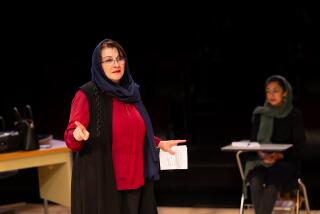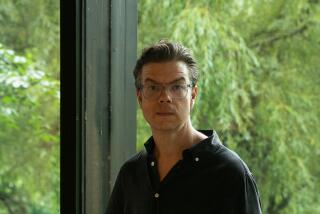Coming Up to Oxbridge : The Struggle Over Words : LOOKING FOR CLASS: Seeking Wisdom and Romance at Oxford and Cambridge, <i> By Bruce Feiler Random House: $23; 330 pp.)</i>
- Share via
This place (Cambridge) is the Devil, or at least his principal residence; they call it a University, but any other appellation would have suited it much better, for Study is the last pursuit of the Society. . . . I have only supped at home three times since my arrival, and my table is constantly covered with invitations.
--Lord Byron. Letter, 1805
The first time I saw Cambridge, I was 17 years old. A friend and I had driven across England to visit the medieval town and parked outside the colonnades of Trinity College, one of the two dozen semi-independent units that make up the university. As I walked through the gilded courtyard--the largest in Europe--its simple sandstone buildings seemed to sweep away from me, down to a silvery river where gondola-like punts floated past ivy-covered walls, under Gothic bridges and on to a future that I could only imagine. I knew at that point there was nowhere in the world I wanted to be as much as Cambridge.
Even now in my dreams, 12 years since I last saw the city, it still haunts me. Vistas that I try futilely to recreate in my waking mind will suddenly appear in all their age-worn detail, and friends whose faces have become mere blurs will re-emerge, laughing and talking and drinking and smoking as exuberantly as they did then. In those dreams, the city is as alive and vibrant as it was every day of the three years I eventually came to spend there.
It was painful for me, given these memories, to read Bruce Feiler’s very different view of Cambridge. (Oxford, which figures in the title of his book, plays only a minor role here.) As much as I loved the university, he dislikes it; as utterly as I was at ease there, he appears to have felt out-of-place. And yet the striking thing about his book, for all its divergence of opinion from my own, is how completely recognizable the world he describes is, and how vividly he makes it spring to life before us.
Feiler, a graduate of Yale in his 20s, spent a year at Cambridge preparing a master’s degree in international relations. He had already lived and taught in Japan for several years (an account he engagingly presents in “Learning to Bow: Inside the Heart of Japan”), and there are times when one feels he both liked and understood that country better. One problem, strangely enough, was the language. He amusingly describes landing at Heathrow airport at the beginning of his stay and being tempted to fly to Paris instead. “At least there,” he notes, “I could speak the language.”
Indeed language, that common tongue that divides England from America, sometimes emerges as the critical barrier between Feiler and the strange old world he encounters. It’s not just a question of vocabulary (his rooms, when he arrives, turn out to be a mere room; academic terms have names like Michaelmas and Lent; and flirting goes by the bizarre appellation sharking ); it’s the very spirit behind the words. In a telephone interview before reaching Cambridge, he recounts his shock when an interviewer criticizes a “blemish” on his record--his having had only a B+ in French at Yale. To any English ear, the ironic teasing of this comment is only too apparent. But not to Feiler.
Such trans-Atlantic differences dominate the book. “For an American, living in Britain is often like living in a time warp,” Feiler notes. “A variety of elements contribute to this feeling. Telephones have numbers that range from five to seven digits and receivers that weigh from three to five pounds. Rooms have light bulbs that are 60 watts too low and electrical outlets that have varying configurations of holes so (that) household appliances are always sold with no plugs attached. Even the air is congested with a postnasal drip that impedes the passage of time. But nothing contributes more to this sense of delay than the national obsession with conversations, which proceed slowly and surely around the country every day with a passion for language, a zest for altercation, and the occasional whiff of old-fashioned snobbery.”
A passion for language. A zest for altercation. There, more than anything else, lies the glory of Cambridge and the aspect I miss the most about it: the cut-and-thrust of ideas, the struggle over words. And it is surprising that Feiler, with his generous curiosity about other cultures, doesn’t care for these. Perhaps it is his (to a European) very American sense of pragmatism that rejects such airy discussions as pointless; perhaps, too, it is his awareness of the snobbery that occasionally lies behind such verbal duels.
Cambridge is a curious place--a mixture of the intellectually lofty and the most dreadfully petty; an ivory tower that can be the most wonderful crucible of ideas and also quite removed from the “real” world; the most romantic city on earth and, at the same time, one in which romance can sometimes appear squalid.
It is this, most of all, that seems to bother Feiler. Oxford and Cambridge are “probably the two most concentrated centers for decadence anywhere in the country,” he writes, and “Cambridge today is a sexual melting pot where the inexperienced meet the idealistic, the promiscuous meet the repressed, and where classical Aristotelian notions of love meet modern sexual perversions of a type of which Jane Austen never dreamed. It is, in short, a laboratory of love.” It is; but is that so very bad?
And Feiler is not above indulging in a little love himself. Indeed, the most humorous parts of his book center on his search for a relationship, as he comes close to being involved with an appealing neighbor, falls for a Rhodes scholar from Oxford (only to be abandoned for his lack of originality) and at the last minute finds a date who transforms the May Ball that concludes his academic stay (May Balls, with typical Oxbridge obfuscation, actually take place in June) into a night of enchantment and romance.
Feiler’s most serious critique centers on the source of Oxford and Cambridge’s fame, their level of education. For places that nurtured, among others, John Milton, Isaac Newton, Stephen Hawking and the current President of the United States, that is quite an indictment. Education in both universities is based on the in-depth study of one subject and this centers on a weekly “supervision” or “tutorial” in which a student meets alone, or with one other student, with his professor to present a paper and prepare his work for the week ahead.
Feiler is outraged by this system. “The myth in Cambridge is that students participate equally in their one-on-one tuition,” he writes. “The reality is that only one side usually gets to speak. Exceptions to this formula are so rare that when a student does speak up in class and breaks down the invisible barrier, the incident becomes, in an academic sort of way, exciting.” How vastly we differ. Of all the things I remember best about Cambridge, it is these private sessions, passionate discussions that would often continue for hours, sometimes well into the night. In retrospect, I marvel at the tolerance most of my tutors showed for the simplistic and under-informed ideas of their pupil.
Cambridge is, in truth, two places: the city of spires and dreams and the quest for knowledge--the one that I’ve looked back on with so much love for the past several years--and the stultifying remnant of a monastic, class-bound life that was the essence of the university when it was founded in 1209. Feiler’s perspective is to stress the latter; and yet, with all his conviction, he never managed to make me forget the former.
More to Read
Sign up for our Book Club newsletter
Get the latest news, events and more from the Los Angeles Times Book Club, and help us get L.A. reading and talking.
You may occasionally receive promotional content from the Los Angeles Times.









